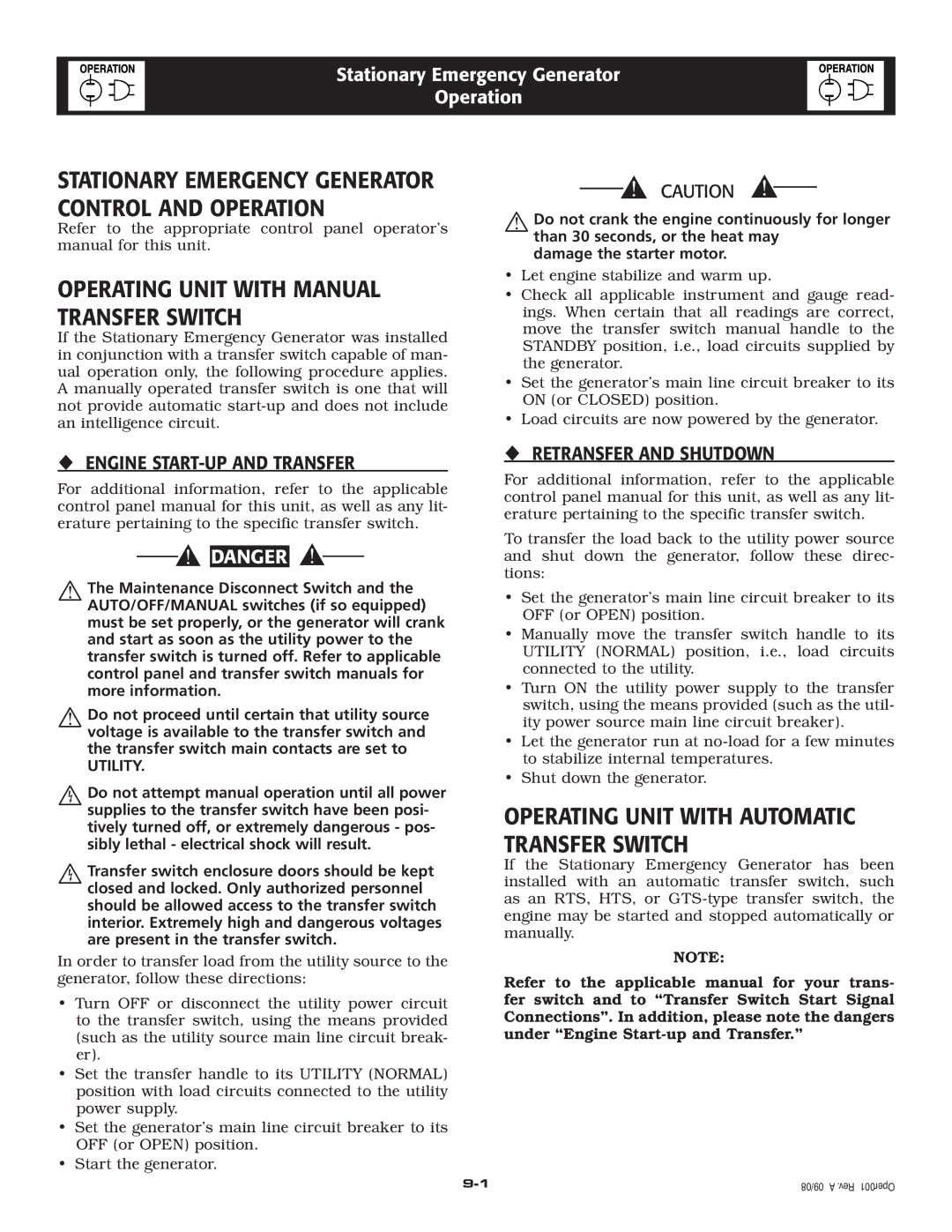
Stationary Emergency Generator
Operation
STATIONARY EMERGENCY GENERATOR CONTROL AND OPERATION
Refer to the appropriate control panel operator’s manual for this unit.
OPERATING UNIT WITH MANUAL TRANSFER SWITCH
If the Stationary Emergency Generator was installed in conjunction with a transfer switch capable of man- ual operation only, the following procedure applies. A manually operated transfer switch is one that will not provide automatic
Do not crank the engine continuously for longer than 30 seconds, or the heat may
damage the starter motor.
•Let engine stabilize and warm up.
•Check all applicable instrument and gauge read- ings. When certain that all readings are correct, move the transfer switch manual handle to the STANDBY position, i.e., load circuits supplied by the generator.
•Set the generator’s main line circuit breaker to its ON (or CLOSED) position.
•Load circuits are now powered by the generator.
ENGINE START-UP AND TRANSFER
For additional information, refer to the applicable control panel manual for this unit, as well as any lit- erature pertaining to the specific transfer switch.
![]()
![]() DANGER
DANGER
The Maintenance Disconnect Switch and the AUTO/OFF/MANUAL switches (if so equipped) must be set properly, or the generator will crank and start as soon as the utility power to the transfer switch is turned off. Refer to applicable control panel and transfer switch manuals for more information.
Do not proceed until certain that utility source voltage is available to the transfer switch and the transfer switch main contacts are set to
UTILITY.
Do not attempt manual operation until all power supplies to the transfer switch have been posi- tively turned off, or extremely dangerous - pos- sibly lethal - electrical shock will result.
Transfer switch enclosure doors should be kept closed and locked. Only authorized personnel should be allowed access to the transfer switch interior. Extremely high and dangerous voltages are present in the transfer switch.
In order to transfer load from the utility source to the generator, follow these directions:
•Turn OFF or disconnect the utility power circuit to the transfer switch, using the means provided (such as the utility source main line circuit break- er).
•Set the transfer handle to its UTILITY (NORMAL) position with load circuits connected to the utility power supply.
•Set the generator’s main line circuit breaker to its OFF (or OPEN) position.
•Start the generator.
RETRANSFER AND SHUTDOWN
For additional information, refer to the applicable control panel manual for this unit, as well as any lit- erature pertaining to the specific transfer switch.
To transfer the load back to the utility power source and shut down the generator, follow these direc- tions:
•Set the generator’s main line circuit breaker to its OFF (or OPEN) position.
•Manually move the transfer switch handle to its UTILITY (NORMAL) position, i.e., load circuits connected to the utility.
•Turn ON the utility power supply to the transfer switch, using the means provided (such as the util- ity power source main line circuit breaker).
•Let the generator run at
•Shut down the generator.
OPERATING UNIT WITH AUTOMATIC TRANSFER SWITCH
If the Stationary Emergency Generator has been installed with an automatic transfer switch, such as an RTS, HTS, or
NOTE:
Refer to the applicable manual for your trans- fer switch and to “Transfer Switch Start Signal Connections”. In addition, please note the dangers under “Engine
09/08 A .Rev Oper001 |
